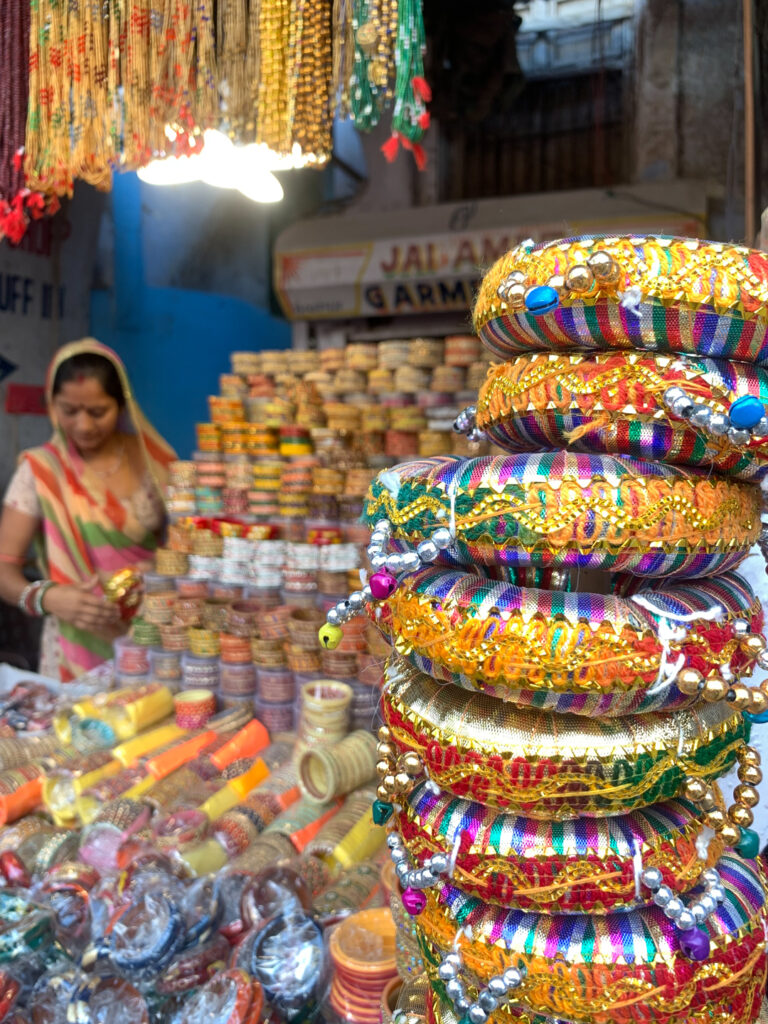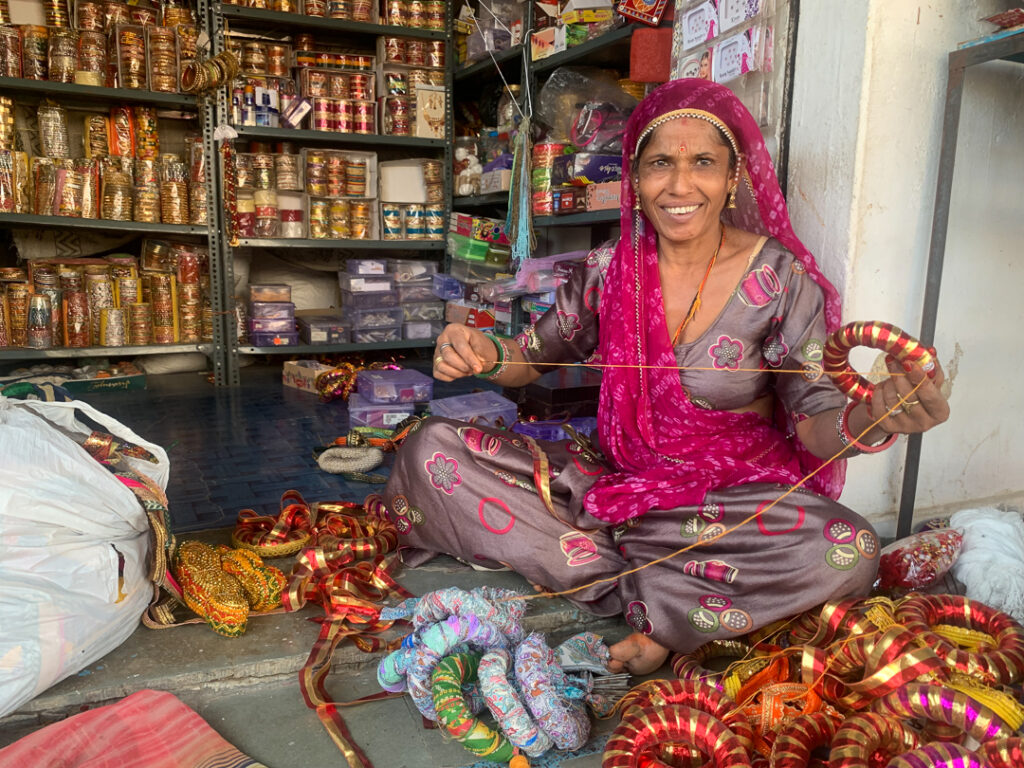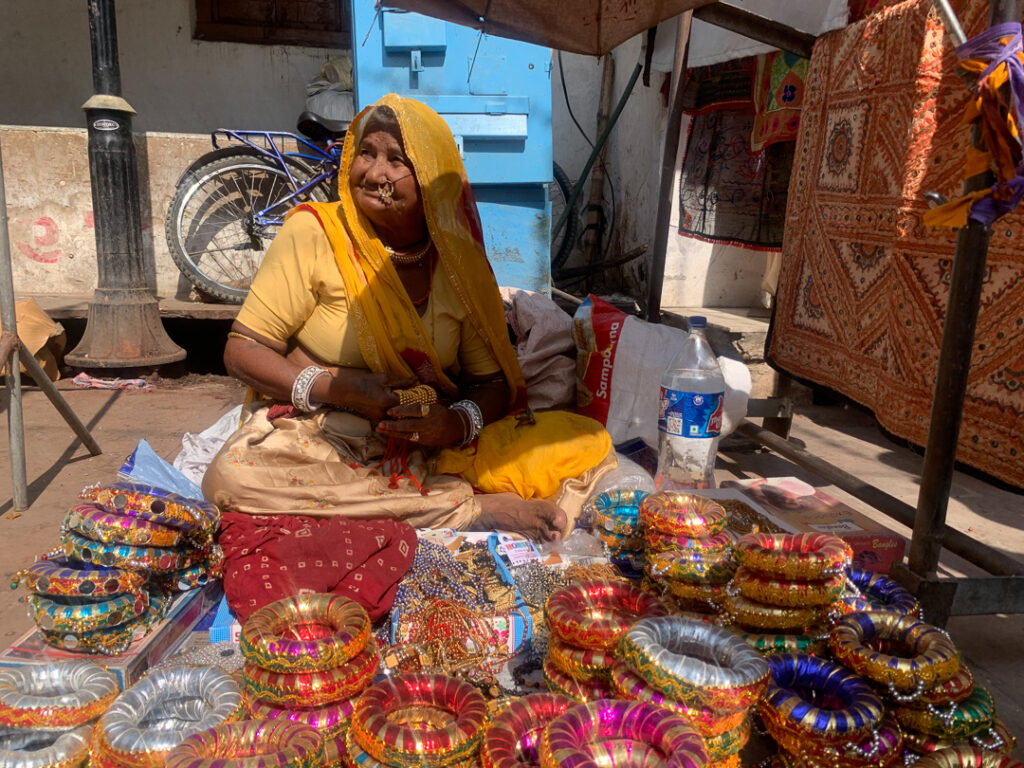Shefali Martins writes about the indoni, a richly decorated base still used today by Rajasthanis for balancing pots on their heads.
The land of colours and motifs, Rajasthan, conjures up the images of women wearing brightly coloured ghaghras and odhnis, delicately balancing pots on their heads as they walk across the desert to fetch water. A small but crucial part of this picture is the circular motif of the indoni — a round circular base on which women balance the pots. This indoni has been a motif of existence for Rajasthan, from times past right up to the present, supporting the multiple pots of life-giving water that women fetch each day in the desert state. As the indoni was such an essential part of their lives, women indoni makers began to embellish indonis with the gota that adorns their vivid attire. And, women indoni makers of Pushkar have made indonis into a means of livelihood.
One such indoni maker is Manju Devi, an entrepreneur like many women of her area, who runs a little shop in Ganahera village, outside Pushkar. She took to indoni making only after moving to Pushkar from Bherunda village, 22 years ago. “In my early years in Pushkar, I used to sit in the market with a basket of bangles. I saw women who were bangle sellers like me making indonis. I learnt by observing them and started making indonis as a lot of people like to buy these from Pushkar. Now, I run a small shop in Ganahera and I’m known for my indonis,” shares Manju who sells bangles, indonis, trinkets, gota, pins, bindis, sanitary pads, wrapping paper and even brooms at her shop. She has named her shop Manju Fancy Store and takes pride in the fact that she is selling something she makes herself.
Walk down the markets of Pushkar and you’ll find each bangle and jewellery cart or shop selling these indonis. In fact, shaped like big, thick bangles, they add even more colour to the shops that are run by women. “We all make and sell indonis alongside bangles because this is a characteristic craft of Pushkar,” says Indra Devi, a bangle seller who puts up her shop at Badi Basti in Pushkar.

Indra Devi, Indoni Maker and Bangle seller, 2022, gota wrapped circular cloth base, beads and bells embellishment, diameter 12 cm.
The indoni in itself is a lesson in sustainability. The base circle is made from leftover strips of fabric from garment manufacturers of Pushkar.
One might think that with the situation of water supply improving now, the sales of indoni would have dwindled. But that is not true, share the indoni makers. “Indonis have a great significance in the kalash ritual performed during weddings. So, they are in great demand during the wedding season. The kanwads (pilgrims) carrying water from Hardwar during the month of Shravan also use our indonis. They are used during garba during Navratri, too. It is considered auspicious to use Pushkar indonis,” Indra adds.
Not only rituals, but folk songs also celebrate the metaphoric value of the indoni in the economic aspect of the life of the Rajasthani woman. While a basic indoni costs Rs. 10, there is a famous Rajasthani song that sings of one’s indoni worth 1.25 lakh getting lost and creates a whole sequence around an indoni that has traditionally been a part of the Rajasthani bride’s trousseau given by her parents.
The women make the indonis in bulk and send them to Jaipur, Udaipur, Nimbara and other places. They get orders for making 100 to 500 pieces at a time. For a bulk order, a basic gota indoni sells for Rs. 4 and one with extra embellishments sells for Rs. 15. The retail price for the extra embellished one is around Rs. 25. The most expensive indoni would cost around Rs. 60. Manju also makes indonis that are used to hang small pots and other decorative purposes. “Every 15 days or a month, I prepare a parcel of 500. It is picked up from me and the payment comes to my bank account. This parcel work started 15 years ago. It is this wholesale business that sustained me. I never went to school. But, I run my business independently. I source products and raw material from Ajmer,” Manju, in her mid-40s, says. By selling indonis, she is able to earn Rs. 3,000- Rs. 5,000 a month over and above the sales of other products from her shop. She makes 50 indonis a day and her husband too works on them in the morning before leaving for his tailoring job. Her daughters are married but when they visit her, they help her in making indonis.
- Kanchan Devi, Indoni maker, 2022, gota warapped circular cloth basee, beads and bells embeellishment, 12 cm
- Kanchan Devi, Indoni maker, 2022, gota wrapped circular cloth basee, beads and bells embellishment, diameter 12 cm
Manju believes that being at a location where she is the only one selling these products gives her an edge.
“Women who used to buy from me in the main market of Pushkar come to me here as well. I pay Rs. 3,000 as rent for this shop. I manage to cover the rent and other basic expenses but it was tough during Covid. However, during the lockdown, the shop owner didn’t take rent from me,” she says and adds that having two businesses, indoni making and the shop, helps her. “In the festive season, I earn more by selling bangles at other times, I make more by selling indonis. I buy the base for Rs. 1.50 per piece from the women selling it. The gotta comes for Rs. 500 per kg. The mirrors and embellishments again have a cost. So, I have to spend money even in the base work”.
Manju is one of only three women shopkeepers in this area lined with five-six shops on both sides of the road. She started the shop in Ganahera village three years ago and walks up and down from her house in Pushkar’s Ambedkar Colony.
Ambedkar Colony is where all the indoni maker women live. They begin their day early in the morning at 5-5.30 am and after doing their household chores they come to the market and sell indonis and bangles the entire day. They use their free time at their stalls to make more indonis. Most of these women could never go to school.
Among them is 70-year-old Kanchan Devi who sits on the roadside with her indonis. She has been doing this all her life and still makes 20-30 a day. “I have plain indonis, ones with faux pearls, beads, silver coloured gota and the ones with mirrors – all kinds of variety. I’ve seen a tough life in my youth. I used to go from village to village walking 8-10 km each day with a basket on my head selling gota and indoni. Now, there are more people coming to the market, so I sit here. I’ve spent my entire life doing this,” she shares and then calls out to passers-by asking them to buy her indonis.
Further down the road is Kanchan’s daughter-in-law Sharda (40) who too runs a roadside stall. She makes 50-60 indonis a day. Her 18-year-old daughter helps her in her free time. “This is a prime craft of Pushkar. Most of the indoni sellers around here are related to me. I am not sure if my daughter will take this up, though. She might want to do other things as she is studying further. But I like this work as it helps me in managing my own small expenses,” says Sharda.
The indoni makers of Pushkar do not make a fortune but their craft helps them hold up their heads and fetches them happiness and independence. They are proud that the work of their hands travels far and wide and gives a base to celebrations in people’s lives, just as an indoni gives support to the many pots that rest on it.
Shefali Martins is an independent journalist, educator and recipient of the Sanjoy Ghose Media Awards, 2022, from Ajmer, Rajasthan. This story is a Charkha Feature. Share your feedback on connect@charkha.org





Comments
Very nicely covered story with exhibits .